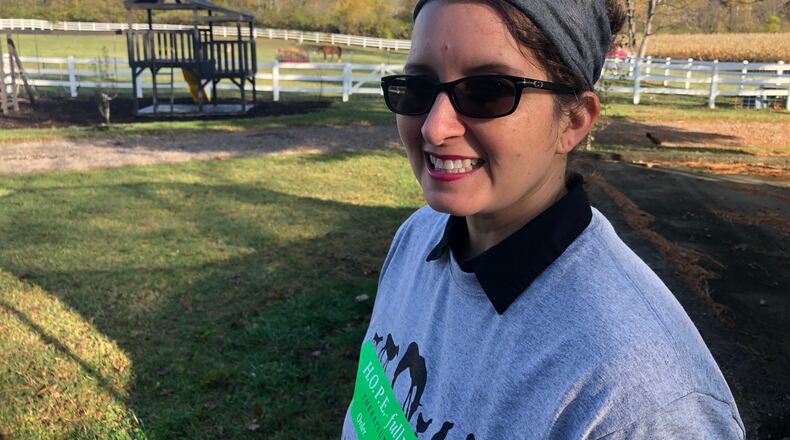She was raised on a dairy farm in Okeana, and her father bought her a Tennessee Walker mare that soon became her “safe place” after school.
Now 41 and married with four biological daughters and one adopted daughter, Carrero recently opened a farm she hopes “creates a safe, therapeutic environment to help vulnerable youth overcome fear, loss and trauma.”
The organization is called Healing Order Peace Encouragement (HOPE)-Full Pastures Therapeutic Farm and is located on six acres on Ross Hanover Road that used to be Baker Photography. The farm held its grand opening on Sept. 26, and in its first month, the non-profit has enrolled six children in the program.
The children are given a tour of the farm and watched as they interact with the horses, cats, chickens, goats, ducks, turkeys, alpacas, donkey and the trusty border collie, Parker. Then the children are partnered with an animal and through those interactions, hopefully they open up about their troubles to a trained therapist, said Carrero.
“You can talk to an animal and not be judged,” she said. “That animal will not tell your secrets. You can get so much more during those conversations than you can in a therapist room. We see this as a need."
Children in the foster system are there because they experienced abandonment, neglect, abuse or all three, she said.
“They need help to process the grief," Carrero said. “It’s not going to happen overnight.”
Carrero and her husband, Isidro, met in 2001 while she was home after returning from a missions trip field. At the time, Isidro was driving a bus at Princeton Pike Church of God and leading its Hispanic ministry. They have been married for 17 years.
They have been licensed foster parents in Butler County for 10 years and have fostered 26 children, all who have been reunited with their families or timed out of the foster system. Since the couple speaks fluent Spanish, most of their foster children are Spanish speaking.
She understands why some people are reluctant to become foster parents. It’s hard work and you don’t get rich.
“Fostering is not for everybody,” she said. “You give away a part of you.”
Their four youngest children, Sofiana, 10, Luciana, 12, Soliana, 14, and Juliana, 15, are homeschooled and play an active role in the farm. They start their schooling at 6 a.m. and care for the farm animals in the afternoon. When the family takes in a foster child, the girls understand there may be another shift in living arrangements.
“They have the vision, they have the heart.," Carrero said of her daughters.
She, too, has a vision. She wants to expand the farm to include an indoor therapy center that would allow it to be open year around, turn the former photo studio into a place where students can learn art, music, dance and vocational skills, and convert their home into a place for teenage girls.
As a mother of five daughters between 10 and 21 years old, Carrero understands their challenges.
“They need a safe place to stay,” she said. “Need a mentor, a life coach. A lot of them have lived adult lives."
As Carrero finished up the interview, her daughters started putting their animals back in the barn. That brought a smile to her face.
“It’s worth doing the hard work for the child,” she said. “Those seeds are forever planted in their hearts. Some of the kids don’t know what a family should look like. If we just impact one child, we are successful."
About the Author




